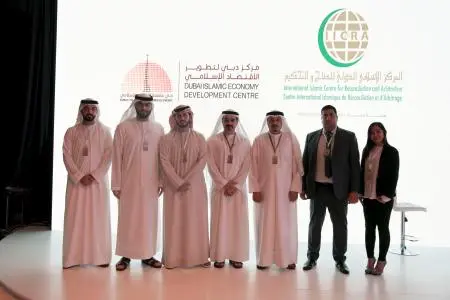PHOTO
Dubai-UAE:– Dubai Islamic Economy Development Centre (DIEDC) and the International Islamic Centre for Reconciliation and Arbitration (IICRA) today inked a memorandum of understanding (MoU) to strengthen cooperation in the Islamic finance industry.
Abdulla Mohammed Al Awar, Chief Executive Officer of DIEDC, and His Excellency Rami Sulaiman, Chief Executive Officer of IICRA, signed the MoU on the sidelines of the Global Islamic Economy Summit (GIES) 2018 in Dubai, in the presence of His Excellency Professor Jassem Ali Al Shamsi, Chairman of the Board of Trustees at IICRA.
The agreement is an outcome of the shared interest of the two entities in promoting the Islamic economy as a key contributor to economic growth, diversification and sustainability locally, regionally and globally. The MoU outlines the terms for the activation of cooperation mechanisms between the two institutions to expand the knowledge and legal framework related to Islamic financial transactions, and thereby strengthen the Islamic economy.
Abdulla Mohammed Al Awar noted that the agreement is the result of the Centre’s concerted efforts to expand its network of strategic partnerships that seek to develop Islamic economic sectors and consolidate Dubai's status as the global capital of the Islamic economy.
He said: “The sustained growth of the Islamic economy, as evidenced by its increased contributions to the GDPs of several countries, requires us to devise innovative ways of reconciliation, arbitration and litigation in the event of disputes.”
In this context, Abdulla Mohammed Al Awar highlighted the importance of the newly signed MoU. He added that cooperation in the field of Islamic finance has reached record levels, with multiple entities working to advance this important sector of the Islamic economy that benefits national economies and drives sustainable growth.
Speaking on the agreement, His Excellency Rami Sulaiman said: “As one of the pioneering institutions of the Islamic finance industry, IICRA is keen to step up cooperation with leading Islamic economy stakeholders, such as DIEDC. Collective action is the need of the hour to address current and future challenges and achieve sustainable development.”
He pointed out that IICRA is witnessing increasing demand from institutions across the globe, especially large Islamic banks, to include its arbitration clause in their contracts and agreements.
IICRA’s activity also extends to keeping up to date with the latest developments in the Islamic finance industry around the world. These developments must be reflected in its arbitration legal framework that provides a platform for resolving banking, financial, commercial and investment disputes in compliance with sharia principles and in accordance with the highest international standards and best practices.
Headquartered in Dubai, the International Islamic Centre for Reconciliation and Arbitration is a global institution specialising in the resolution of disputes through reconciliation and institutional arbitration. IICRA was established under an international agreement signed in 2005, owing to the efforts of several Islamic economy stakeholders, including the General Council for Islamic Banks and Financial Institutions, the Islamic Development Bank, and the Government of the UAE.
-Ends-
About Dubai Islamic Economy Development Centre
Dubai Islamic Economy Development Centre (DIEDC) was established in December 2013 under the supervision of His Highness Sheikh Hamdan bin Mohammed bin Rashid Al Maktoum, Crown Prince of Dubai and Chairman of The Executive Council of Dubai, to transform Dubai into the capital of Islamic economy.
In 2017, DIEDC launched its refreshed Islamic economy strategy (2017-2021) that focuses on identifying new key performance indicators (KPIs) for monitoring the growth of three core Islamic economy sectors – Islamic finance, halal products, and Islamic lifestyle encompassing culture, art, fashion and family tourism – in addition to measuring their contribution to the UAE’s national economy. Knowledge, standards and digital Islamic economy serve as cornerstones that support these key sectors in achieving the leadership’s Islamic economy vision.
As part of the new mandate, DIEDC is keen to develop strategic partnerships with local and international organisations to build a robust framework and comprehensive ecosystem of Islamic economy principles and regulations.
DIEDC seeks to empower young talent with the required skillset to boost growth across the strategic Islamic economy sectors and contribute to achieving sustainable development for the wider global community.
Follow DIEDC on:
https://www.linkedin.com/company/dubai-islamic-economy-development-center/
https://www.youtube.com/channel/UCVvIV5ANNUgjf9W8yZXCsbQ
https://www.instagram.com/iedcdubai/
© Press Release 2018Disclaimer: The contents of this press release was provided from an external third party provider. This website is not responsible for, and does not control, such external content. This content is provided on an “as is” and “as available” basis and has not been edited in any way. Neither this website nor our affiliates guarantee the accuracy of or endorse the views or opinions expressed in this press release.
The press release is provided for informational purposes only. The content does not provide tax, legal or investment advice or opinion regarding the suitability, value or profitability of any particular security, portfolio or investment strategy. Neither this website nor our affiliates shall be liable for any errors or inaccuracies in the content, or for any actions taken by you in reliance thereon. You expressly agree that your use of the information within this article is at your sole risk.
To the fullest extent permitted by applicable law, this website, its parent company, its subsidiaries, its affiliates and the respective shareholders, directors, officers, employees, agents, advertisers, content providers and licensors will not be liable (jointly or severally) to you for any direct, indirect, consequential, special, incidental, punitive or exemplary damages, including without limitation, lost profits, lost savings and lost revenues, whether in negligence, tort, contract or any other theory of liability, even if the parties have been advised of the possibility or could have foreseen any such damages.




















